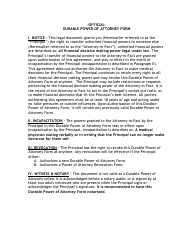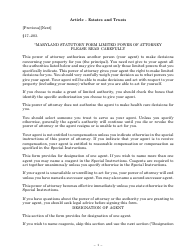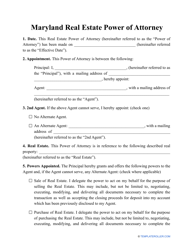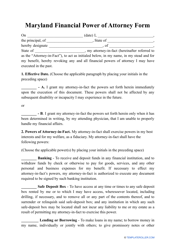Durable Power of Attorney Form - Maryland
The Durable Power of Attorney Form in Maryland is used to grant someone else the authority to act on your behalf for financial and legal matters, even if you become incapacitated.
In Maryland, the person who wants to grant power of attorney must file the durable power of attorney form.
FAQ
Q: What is a durable power of attorney?
A: A durable power of attorney is a legal document that allows someone else to make financial and legal decisions on your behalf if you become unable to do so.
Q: Why do I need a durable power of attorney?
A: A durable power of attorney ensures that someone you trust can handle your financial and legal matters if you become incapacitated or unable to make decisions.
Q: How do I create a durable power of attorney in Maryland?
A: To create a durable power of attorney in Maryland, you need to fill out and sign a specific form that is recognized by the state.
Q: Who can be appointed as my attorney-in-fact?
A: You can appoint any individual who is at least 18 years old and capable of handling the responsibilities.
Q: Can I revoke or change my durable power of attorney?
A: Yes, you can revoke or change your durable power of attorney at any time as long as you are still competent to make decisions.
Q: When does a durable power of attorney become effective?
A: A durable power of attorney can become effective immediately or upon a specified event, such as your incapacitation.
Q: Do I need a lawyer to create a durable power of attorney?
A: While it is not required by law, it is advisable to consult with a lawyer to ensure that your durable power of attorney is legally sound.
Q: Can a durable power of attorney be used for healthcare decisions?
A: No, a durable power of attorney specifically handles financial and legal matters. For healthcare decisions, you would need a separate healthcare power of attorney or advanced directive.
Q: Is a durable power of attorney valid across state lines?
A: Generally, a durable power of attorney executed in one state will be valid in another state as long as it meets the legal requirements of that state.





















